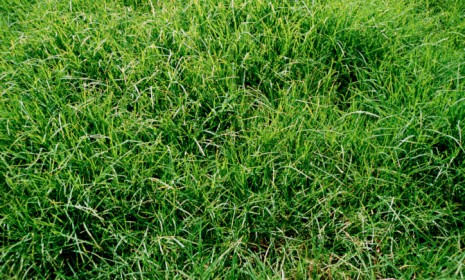Did early humans eat grass?
A new study suggests our ancient ancestors probably wouldn't mind having dinner on your front lawn

A free daily email with the biggest news stories of the day – and the best features from TheWeek.com
You are now subscribed
Your newsletter sign-up was successful
Grass is plentiful, non-toxic, and edible, but nonetheless it's impractical for us to eat the stuff. The reasoning is two fold: First, our stomachs have a difficult time digesting certain kinds of raw leaves and grasses. Second, grass contains a lot of silica, an abrasive substance that wears down your teeth. Unlike grazing animals like cows, we don't have teeth that continue to grow well into adulthood.
A new study of fossil evidence from Central Africa, however, suggests that our early ancestors had a taste for meadows 3.5 million years ago and were better equipped to consume grass. Though they walked upright, these early hominins — Australopithecus bahrelghazali — were hairier and smaller than modern humans, looked more like apes, and possessed "big, impressive teeth" that could endure a diet that included grass. In the new study, published in the Proceedings of the National Academy of Sciences, researchers identified grass' molecular signature in the teeth of three specimens.
Researchers say that this evolutionary move from fruits and leaves to tropical grasses represents a "major shift" in early human eating-habits. "No African great apes, including chimpanzees, eat this type of food despite the fact it grows in abundance in tropical and subtropical regions," co-author Julia Lee-Thorp said in a press release. Grazing on grass (and the roots and bulbs at the base of plants) allowed early humans to emerge from our ancestral forests, colonize new terrain including treeless grasslands, and, in theory, adopt a broader diet — including, eventually, protein-rich animal meat.
The Week
Escape your echo chamber. Get the facts behind the news, plus analysis from multiple perspectives.

Sign up for The Week's Free Newsletters
From our morning news briefing to a weekly Good News Newsletter, get the best of The Week delivered directly to your inbox.
From our morning news briefing to a weekly Good News Newsletter, get the best of The Week delivered directly to your inbox.
There is a slight chance that these early hominin specimens merely ate animals that ate grass. But because most primates don't have "diets rich in animal food... ," argues Lee-Thorp, "we can assume that [early humans] ate the tropical grasses and the sedges directly."
A free daily email with the biggest news stories of the day – and the best features from TheWeek.com
-
 The ‘ravenous’ demand for Cornish minerals
The ‘ravenous’ demand for Cornish mineralsUnder the Radar Growing need for critical minerals to power tech has intensified ‘appetite’ for lithium, which could be a ‘huge boon’ for local economy
-
 Why are election experts taking Trump’s midterm threats seriously?
Why are election experts taking Trump’s midterm threats seriously?IN THE SPOTLIGHT As the president muses about polling place deployments and a centralized electoral system aimed at one-party control, lawmakers are taking this administration at its word
-
 ‘Restaurateurs have become millionaires’
‘Restaurateurs have become millionaires’Instant Opinion Opinion, comment and editorials of the day